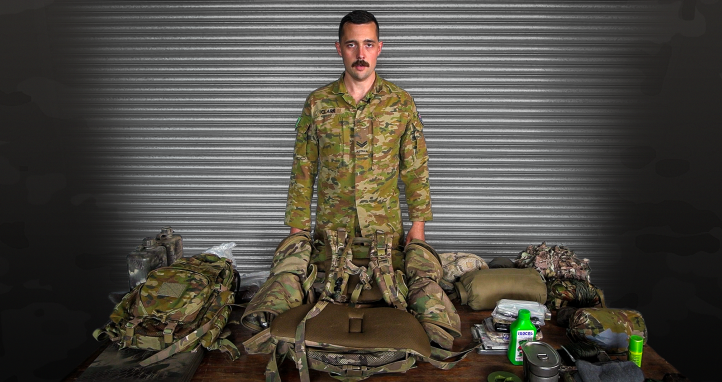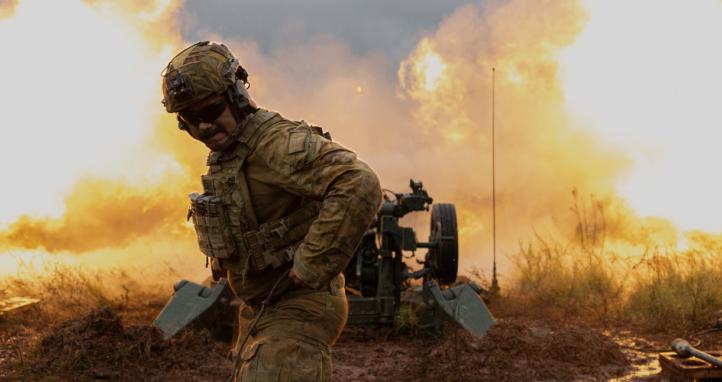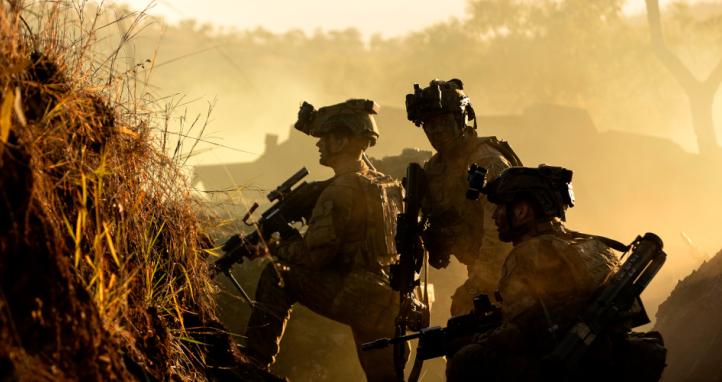Land Warfare Doctrine 1 The Fundamentals of Land Power is very clear - the Australian Army generates its fighting power from the effective integration of physical, moral and intellectual war-fighting components. In building the moral component, we focus on morale, integrity, values, and legitimacy to ensure soldiers demonstrate physical and moral courage in the 'face of mortal peril.' In caring for our soldiers in the aftermath of conflict, much of the focus is on physical and psychological rehabilitation. However, increasingly focus is turning to understanding and responding to 'moral injury' - where people are impacted by decisions, actions or exposure to events that challenge their ethical and moral beliefs.
Moral Component of Fighting Power
'Army's will to fight is provided primarily by the moral component of fighting power’ which ‘supplies and sustains the will to fight.' This component centres on morale, integrity, values, and legitimacy, which are considered the characteristics critical for individuals to act morally during complex operations and overcome pressures that challenge their moral character. Arguably, the foundation element of the moral component of fighting power is an individual's system of beliefs and values which is situated in Army's broader organisational value system based on courage, initiative, respect and teamwork.
What is moral injury?
As briefly noted in the introduction, much of the dialogue on veteran recovery, rehabilitation and reintegration has focused on the physical and psychological impact of operations. While increasing being recognised, including being outlined in the Defence Mental Health and Wellbeing Strategy 2018-2023, the impact of operations on an individual's moral component of fighting power is less discussed.
The term moral injury is used to describe 'a cluster of symptoms - similar to those associated with post traumatic stress disorder (PTSD) - that result from personal experiences, which violate a person's deepest and most closely held values and principles.' While a complex concept, moral injury has been defined in an Australian defence context as:
'Being confronted with events and experiences associated with perpetuating, failing to prevent, or bearing witness to inhumane or cruel actions, or learning about acts that transgress deeply-held moral beliefs and expectations.'
Following a violation of their moral beliefs and values, people may experience feelings of guilt and shame which may lead to turmoil, suffering, inner-conflict, self-condemning behaviour and difficulties in functioning. In some cases, these negative feelings may lead to distress, depression and suicide ideation or suicidal behaviour. While PTSD can be measured clinically and develops after traumatic event, a moral injury can't be differentiated as easily. Making our understanding more difficult is that a moral injury may manifest as part of or in combination with PTSD.
What may cause moral injury?
A key underpinning concept of moral injury is that people interpret experiences differently - a soldier on the ground will have a multi-sensory response to a situation based on what they hear, see, smell, touch or taste but a UAV operator may similarly experience moral injury even though they are physically dislocated from an operation.
At basic level, if we say that moral injury causes guilt and shame, examples of moral injury may include:
- Use of deadly force in combat and causing harm or death that was unintended or without an alternative
- Giving orders in combat that result in the injury or death of a fellow service member
- Returning home from deployment and hearing of the executions of cooperating local nationals
- Failing to report knowledge of sexual assault or rape committed against oneself, a fellow service member, or civilians
- A change in belief about the necessity or justification for war, during or after one's service
- Following orders that were illegal, immoral, and/or against the Rules of Engagement or Geneva Conventions.
Anecdotally within the Australian context, socially confronting practices such as child brides, victimising young children, and honour injuries or killings have morally impacted soldiers.
Solutions?
Dr Tom Frame identifies two experiences which may be influencing how veterans are responding to their operational service - firstly, an inability to share their experiences (stories) in a way that helps them integrate morally injurious experiences into their personal narrative, and secondly, the society's inability to recognise their experiences and incorporate them into national dialogue. He believes that a critical part of addressing moral injury is 'having an ethical dialogue around operational experiences.'
A DVA Rapid Evidence Assessment to identify effective interventions for veterans who have experienced moral injury noted that therapies that may be appropriate include cognitive behavioural therapy, cognitive processing therapy, eye movement desensitisation and reprocessing, prolonged exposure, acceptance and commitment therapy, adaptive disclosure, and spiritual, religious and social treatments. However, it is acknowledged that rigorous moral injury research is in its infancy, with Open Arms (previously VVCS) sponsoring a project to develop a scale to assess moral injury in veterans.
Social interaction and connections are also thought to help morally injured veterans heal. An American research project on moral injury and suicidal ideation after military service identified that veterans who had experienced 'potentially morally injurious events' but had high levels of social support had a decreased likelihood of negative mental health outcomes, guilt and shame. Veterans not coping as well after such events reported being isolated and lacked support from friends, family and peers. Of note is the use of interviews in the research - the author listed to veterans and their experiences - with the qualitative analysis confirming that social support plays a key role in the prevention of moral injury-related symptoms and reintegration after deployment.
Chaplaincy and spiritual care has also been raised as an approach to screening and treating moral injury in veterans. One technique proposed is 'Pastoral Narrative Disclosure' which holistically considers an individual, embraces their stories as part of their being, and enables disclosure, which is a modern term given to confession. In essence, it is a revised confessional model based on eight phases - rapport, reflection, review, reconstruction, restoration, ritual, renewal and re-connection. The use of chaplains and spiritual care in addressing moral injury is an individual preference, with it recognised that medical professionals and chaplains work within different professional boundaries.
Prevention of moral injury should also be part of the discussion - how do we learn to prevent or mitigate moral injury in future generations, noting that operations will always have elements that are confronting, uncertain and unpredictable. One way is through thorough and honest cultural training on the country or region of deployment, including a detailed description of potentially confronting cultural practices. Insight into the strategic purpose of an operational mission may also provide soldiers with the knowledge required to frame potentially morally injurious events. This may elevate anger and hurt building when there is an observed lack of response, or alternatively, acceptance of confronting practices. These are parts of an organisational and leadership 'layer of protection against moral injury'.
In Conclusion
he need for great understanding of moral injuries is increasing, with Defence and DVA collaboratively engaging with domestic and international research institutes to frame the impact of moral injury on Australian veterans. An Australian doctoral project on the concept of moral injury is also underway through the University of New England. Critically, these projects will form an evidence-base to identify strategies, responses and viable treatments. The moral domain of fighting power needs to extend beyond the more traditional view of 'soul repair' using spiritual care, and extend into a commitment to listen to soldiers and their operational experiences - no matter how hard they are to hear. In doing so, the Army can learn how to better train, educate, inform and prepare its people for the moral challenges of operations.




